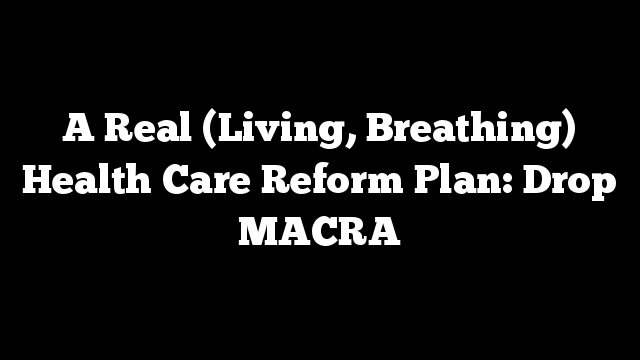 Dear Washington,
Dear Washington,
Congratulations! You have listened to the AMA and practicing physicians and made it a little easier to comply (at first) with the Medicare Quality Payment Program, part of the massive MACRA “pay for value” law.
But CMS’ announcements in The Federal Register and “fact sheet” are incomprehensible gobbledygook that will be understood by neither doctors, patients, nor the rest of society. The language personifies the complexity, unwieldiness and confused thinking in this huge national policy.
MACRA is a $15 billion boondoggle that the best research shows will neither improve quality nor control costs. Paying doctors for quality (e.g., doing a blood pressure exam) or efficiency may make sense theoretically, but it doesn’t work. Rather than making a dent in the continuing upward spiral of healthcare costs in America, it can even result in some doctors avoiding sicker patients because it affects their quality scores and income.
Early, poorly designed research suggested that paying for health or cost savings was effective, but these research designs did not account for already occurring improvements in medical practice that the policymakers took credit for. Decades of stronger, well-controlled research debunked these early findings and conclusively showed no effects of these economic policies.
So why does the Congress and administration continue to press ahead with this same tired and impotent policy?
Most importantly, a large cadre of influential economists have convinced the government that money is the only driver of quality and efficiency. Nothing could be further from the truth. Many factors affect measures of quality and cost savings. These include:
Social problems and lack of supports are root causes of poor health outcomes. These include poverty, language barriers, spousal abuse, drug abuse, rurality, early manifestations of dementia and many more. These factors are usually not measured by Medicare.
Further, doctors do not prescribe antibiotic medications to patients who are allergic to them even if they are promoted in a quality measure. Similarly, after the ACA required CMS to penalize hospitals for hospital-acquired infections, studies showed that some doctors were simply altering codes to make it appear that the patient was admitted with the infection. When a better CDC dataset was used instead of “doctored” Medicare claims, this study showed no effect of the penalties on infection rates.
In addition, as Uwe Reinhardt said, “the idea that everyone’s professionalism and goodwill has to be bought with tips is bizarre.” Why should Doctors only respond to financial incentives when thousands of studies have shown that opinion leaders, knowledge, clinical skills, patient demands and many other non-monetary factors all influence quality of care?
Perhaps the biggest reason for this giant boondoggle is the unflinching confidence in economic theories and models that lack a shred of evidence. Even pay-for-value and alternative quality contract policies lack any evidence that support programs like MACRA. In fact, we now have several large studies of accountable care organizations (ACOs) published in top medical journals that celebrate an inconsequential savings of about 1% without even considering (or measuring) that healthcare delivery systems spend much more than this in ACO operational costs; thus, the MACRA-Like ACOs actually lose money on a societal basis.
Currently, we are abusing primary care doctors on the front line with dozens of bureaucratic penalties and regulatory policies aimed at improving their performance.
It is time to confront the reality of our abysmal, incomprehensible and inefficient healthcare system that charges far too much to our patients and society at large. It is time to move towards a simpler system that nevertheless embraces certain free-market principles because a single payer plan (“Communist medicine”) is not in the political cards. But we can reduce our healthcare expenditures by almost half by adopting any one of several European health plans that retain an insurance industry, guarantees access to all citizens to see any physician (e.g., in Germany), and totally eliminates high deductible health plans (e.g., those in the ACA) that can delay essential care and cause adverse health effects among low income diabetic patients. The savings are due to fair, negotiated price schedules that are more ethical than widely varying prices in the United States that are sometimes the result of large medical systems with market power determining higher prices than those of smaller institutions.
We spend about one-fifth of our gross domestic product on medical care. If anything, this cost is accelerating since 2000. It is time to stop the nitpicking, band-aid regulatory policies that are driving doctors crazy without reducing costs or improving quality. It is essential to work towards the achievement of a new system of care that covers the entire population and costs less. Neither The ACA nor any Republican plan can accomplish this worthwhile goal.
Stephen Soumerai is Professor of Population Medicine and teaches research methods at Harvard Medical School.
